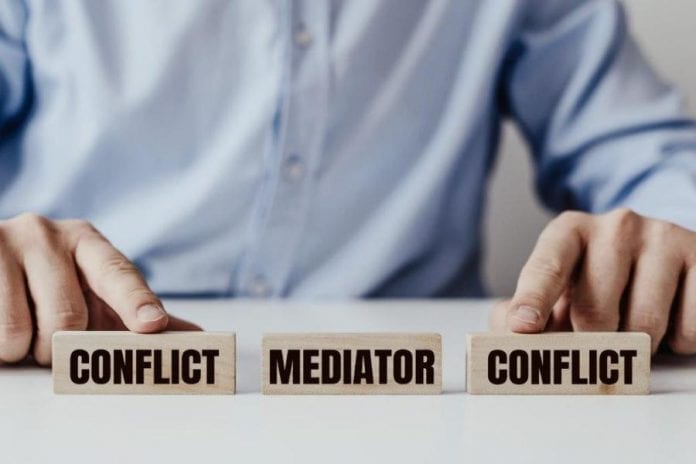Nobody feels like they’re going to get divorced in the future, but unfortunately, statistics tell us the harsh truth. There’s a 50/50 chance that happily forever after is going to end up being happy for some time until it goes south.
Divorce is by no means an easy thing to endure. No matter how good or bad the marriage was, getting divorced is stressful and it takes an emotional toll on you. There are a lot of things to worry and think about during the splitting-up process and if you happen to have kids it makes it even more difficult. That poses the question, is there any way that you can make this process better? Well, it depends on the occasion, the partners in question and the overall situation, however, there’s certainly a chance.

One thing that can be helpful during these troubling and stressful days is having a mediator helping you out. Mediation is an alternative method of settling any potential differences or disputes between the spouses. Don’t get it confused with conflict resolution, it’s not therapy, it’s just a process in which a third-party, neutral mediator helps the soon-to-be-ex spouses reach a mutually beneficial agreement.
As a mediator plays a large and a vital role in the process, it’s advised for it to be an experienced divorce counsellor, the one who understands the procedures, can offer good service and be objective and fair to both parties. If you want the whole process to go as smoothly as possible and without any hiccups or disagreements, it’s best to avoid inexperienced or unknowledgeable mediators and find the right one.

One of the reasons why this is a good option for couples wanting to go their separate ways is that it’s a great way to avoid going to court. However, don’t just avoid going to court at any cost, seek professional advice from an attorney at law. Theirs is a lot riding on the line here, especially if there’s a large estate or children in play. Be smart.
Now, as we’ve mentioned, this could be a good idea, but it doesn’t necessarily have to be. So, before you rush into anything, let’s take a look at some pros and cons of mediation so you can see the bigger, clearer picture.
Let’s start with the pros
1. Not As Expensive
If you compare it to the alternative, which is taking the case to court, this is a much better option financially. Mediation is generally a lot less expensive than going to court and the bill is usually split between the spouses. When you look at it from a financial perspective, it’s not hard to see how this could be the right move. If you have to lose some money in the process, it’s better to lose small.
2. It Saves Time
You don’t want the divorce to be lengthy and dreadful. Ideally, you want it over before it even began, but since that’s impossible, let’s take a look at the next best thing. In the vast majority of cases, mediation takes a lot less time to finalize than going to court. Everything comes into play here – preparations, negotiations, meetings. All of this is done much quicker than if you were to go to court. So, if you want it done swiftly, look for a mediator at Matrimonial Home and get it over with.

3. It Feels Better
There are not a lot of things that feel good when it comes to divorce. Of course, leaving abusive or toxic relationship offers a sense of relief, that goes without saying, but generally speaking, divorce doesn’t feel good. However, if two people are willing to cooperate and work towards their best interests, for theirs or their children’s sake – something about it just feels better. It feels natural. it’s a good way to finish things and an easier way to make some hard decisions or sacrifices for the sake of the overall well-being.
4. It’s Less Formal
Formal processes like going to court make people feel uneasy. On the other hand, mediation is a voluntary, informal process that will make both parties feel more relaxed. Also, you know that you cannot be forced to approve of anything that you don’t like, that you have complete control over the situation and you don’t have to worry about hurrying the process because it’ll cost more or anything of sorts.
Now, that’s all fine and dandy, but now it’s time to look at the cons
5. There’s No Legal Advice
One thing to understand is that mediators do not represent either of the parties and will not offer legal advice or intervene in any way. Their job is to lead the process in an objective, neutral manner, not take sides or offer advice. If the case goes to court, you’ll need a lawyer by your side. Even if you’re a lawyer yourself, it’s not advised to represent yourself in these situations because the emotional turmoil can cloud sound judgement and lead to some bad, life-altering decisions.
6. It Does Not Work For Everyone

The only way mediation is going to work is if both parties are reasonable and willing to cooperate. If you’re separating from a partner who is selfish, unreasonable, manipulative, deceptive or in any other way impossible to cooperate with – this is not the right move for you. As we’ve mentioned, a mediator will not offer legal advice, but it can advise you to proceed with or terminate the mediation process if it seems like it won’t lead anywhere.
It’s Not Necessary
Even though it can be good to have a third party help out, it’s not always necessary. If you and your partner can come up with a mutual agreement and just have lawyers draw up the necessary paperwork for you to sign, you can save a lot of time and money.
It’s not to say that this process is pointless, far from it, it can be quite helpful. However, if you can work things out between yourselves, it’s pointless to waste time and money.
Hopefully, this was helpful and informative, as we’ve tried to equally highlight both benefits and drawbacks of mediation to help you reach the best decision if you have to make one. We sincerely hope we’ve been helpful.









